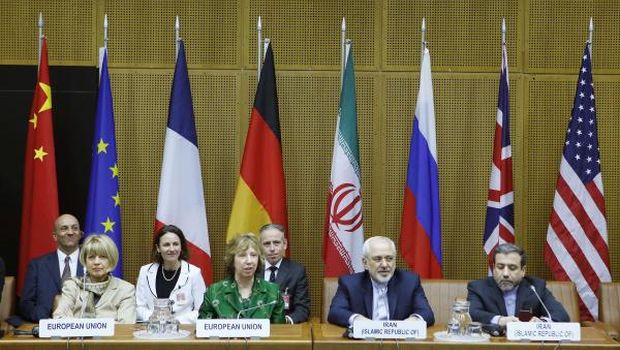
EU Deputy Secretary General Helga Schmid, Vice President of the European Commission Catherine Margaret Ashton, Iranian Foreign Minister Mohammad Javad Zarif, and Iranian ambassador to Austria Hassan Tajik attend talks with Iran at the UN headquarters in Vienna, on April 8, 2014. (AFP Photo/Dieter Nagl)
London, Asharq Al-Awsat—Iran’s team of nuclear negotiators headed to Vienna on Monday for the next round of international talks over the country’s nuclear program, as anger mounted in Iran at EU criticism of its human rights record.
Iran’s team, led by Foreign Minister Mohammad Javad Zarif, headed to the Austrian capital a day after a recent declaration by the European Parliament accusing Iran of “continued, systemic violation of fundamental rights” provoked a counterblast from 200 Iranian MPs.
The European resolution also said that Iran’s last presidential election, in July 2013, did not meet European standards. The Iranian response denounced the move, branding it a clear example of unwanted foreign interference in Iran’s internal affairs.
Mohammad Hassan Asafari, a member of the Iranian parliament’s National Security and Foreign Policy Commission said on Sunday that such statements had the potential to negatively affect the ongoing nuclear talks between Iran and the West.
Iran’s Foreign Ministry also summoned the Greek ambassador on Sunday, as his country currently holds the EU presidency, which rotates among member states.
According to press reports, the head of the ministry’s European affairs department informed the Greek envoy of Iran’s displeasure at the approval of the recent resolution, adding that the resolution was against the common interests of Iran and EU.
Criticism of Iran’s human rights record comes at an especially sensitive time in Iran, with many conservatives and hardliners worried that the US and its allies will attempt to shift pressure on the Islamic Republic to other issues in the wake of a nuclear deal between the two sides.
At a dinner banquet on Monday, Zarif met with EU foreign policy chief Catherine Ashton, who leads the team from the six world powers—the US, France, Britain, Russia, China and Germany—during the nuclear negotiations.
During the meeting, the heads of the negotiating teams are to review reports from delegations of technical experts from both sides, which wrapped up their latest round of talks in Vienna on Saturday, and discuss the agenda for the two-day high-level negotiations, set to begin on Tuesday.
On Saturday, Hamid Ba’eedinejad, the head of Iran’s team of technical experts, described the latest round of the nuclear negotiations as “beneficial.”
The talks between Tehran and the six countries are part of efforts to seal a final deal on Iran’s nuclear energy program. The two sides reached an interim deal on November 24, 2013 in the Swiss city of Geneva. The deal took effect on January 20.
Under the Geneva deal, the six countries agreed to provide Iran with some sanctions relief in exchange for Iran agreeing to limit certain aspects of its nuclear activities during a six-month period. It was also agreed that no nuclear-related sanctions would be imposed on the Islamic Republic within the same timeframe.
